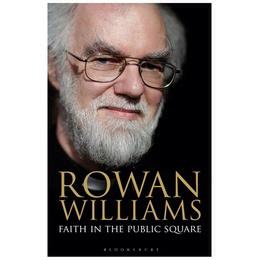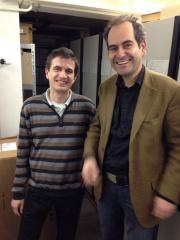Following on from Thursday's visit to Karl Barth's house and my sight of Barth's original handwritten draft of the 1934 Barmen Declaration, I wonder if such a document would be possible in a culture of privatised spirituality such as that assumed by many today to be both desirable and normal.
This isn't a disconnected question. I have spent the last couple of days – on and off – reading the lectures that form the first part of Rowan Williams' Faith in the Public Square. In these pieces he addresses questions of secularism (essentially instrumental/functional, one-dimensional and totalising). Seriously interesting, challenging and written with great lucidity, he goes to the heart of the matter in attesting that the 'public space' of contemporary culture is not in any meaningful sense neutral or free – a a point I keep labouring with less patience and less erudite articulacy than Rowan:

[Telling and enacting a story that is different from that propagated by the modern state] of course involves exposing the fact that the modern state does in fact tell a story: that is, that it is not the embodiment of a timeless rationality. … The main task [of the Church] is to create 'spaces' for an alternative story – to challenge the self-evidence of the narrative of secular modernity. (p.43)
In speaking of the 'market state' – the successor to the 'nation state' – he comes up with the marvellously succinct description of the consumer's role of the last thirty years as “isolated choosing machines in a market-shaped wilderness”. (p.74)
This cannot do justice to the arguments Rowan develops. I do wonder if the leader writers of the Independent newspaper (as well as others) have read these texts and formed any response to the arguments therein. I further wonder if any serious response has been made to Rowan's analysis since the book was published in 2012.
The final lecture in this section addresses the tendency nowadays for people to prefer 'spirituality' to 'religion', but questions the individualism and privatisation under the state that such language assumes. I remember reading a paper in which the writer urged the disbanding of organised churches and the assembling of like-minded 'liberals' who could associate together in the development of a new form of spirituality. I asked how such an atomised peer group would take responsibility for (and on what basis) caring for the poor, the unlovely and those who do not share their premises, and what power such a group would have to challenge injustice on grounds other than convenience or mere opinion/preference. I didn't get an answer.
Journalists used to tell me that Rowan Williams was to obtuse and difficult to read. I used to respond that they were just too lazy to persist – some things are complex and resist simplification. Reading these lectures, I have not changed my mind.
(And the question of the valid/essential role of religion in the public square is not one that Barth would have wasted a moment on, given the choices that had to be made in the face of the rise of Hitler and the criminal nature of 'public truth' in the Germany of the 1930s and '40s.)

Dr Peter Zocher & Prof Dr Martin Wallraff at Karl Barth's house in Basel
 Posted with Blogsy
Posted with Blogsy
